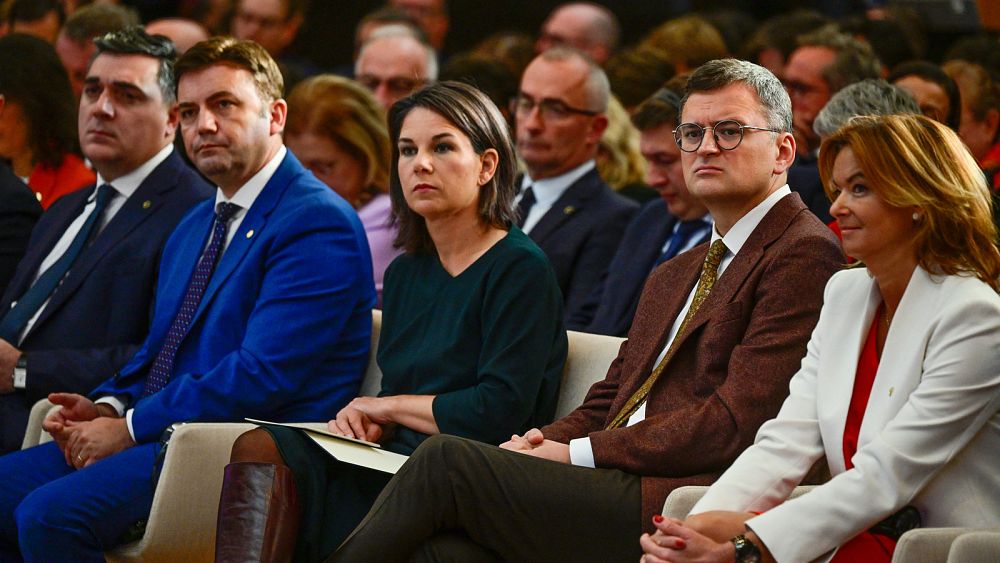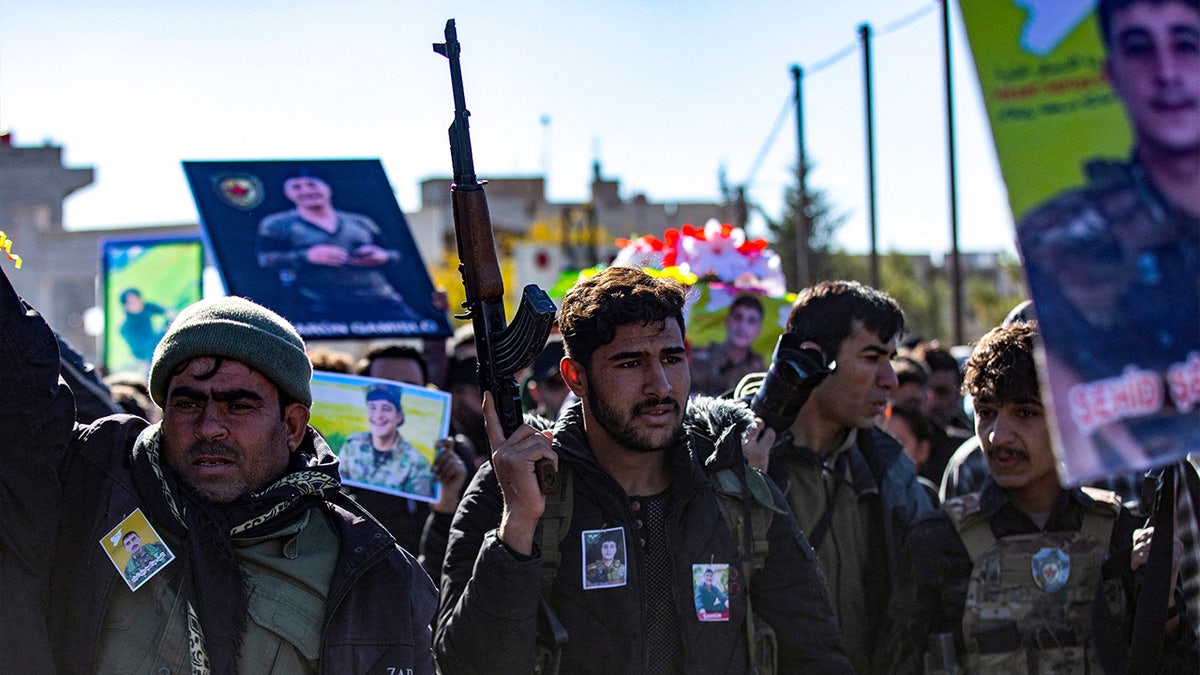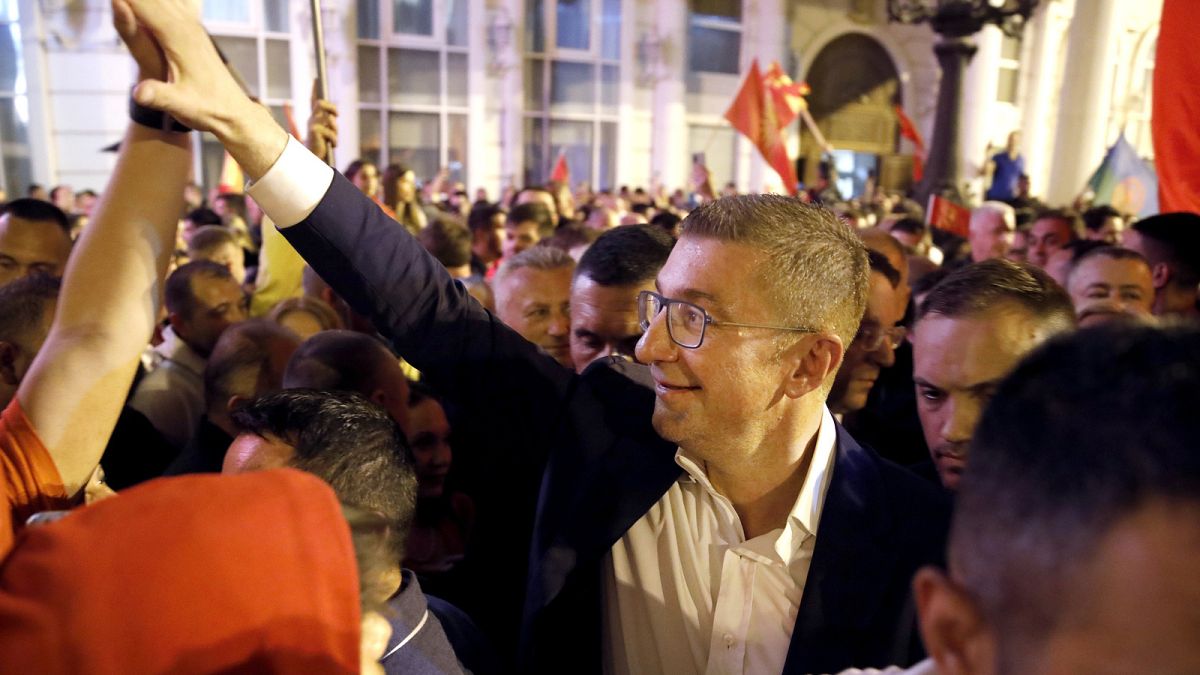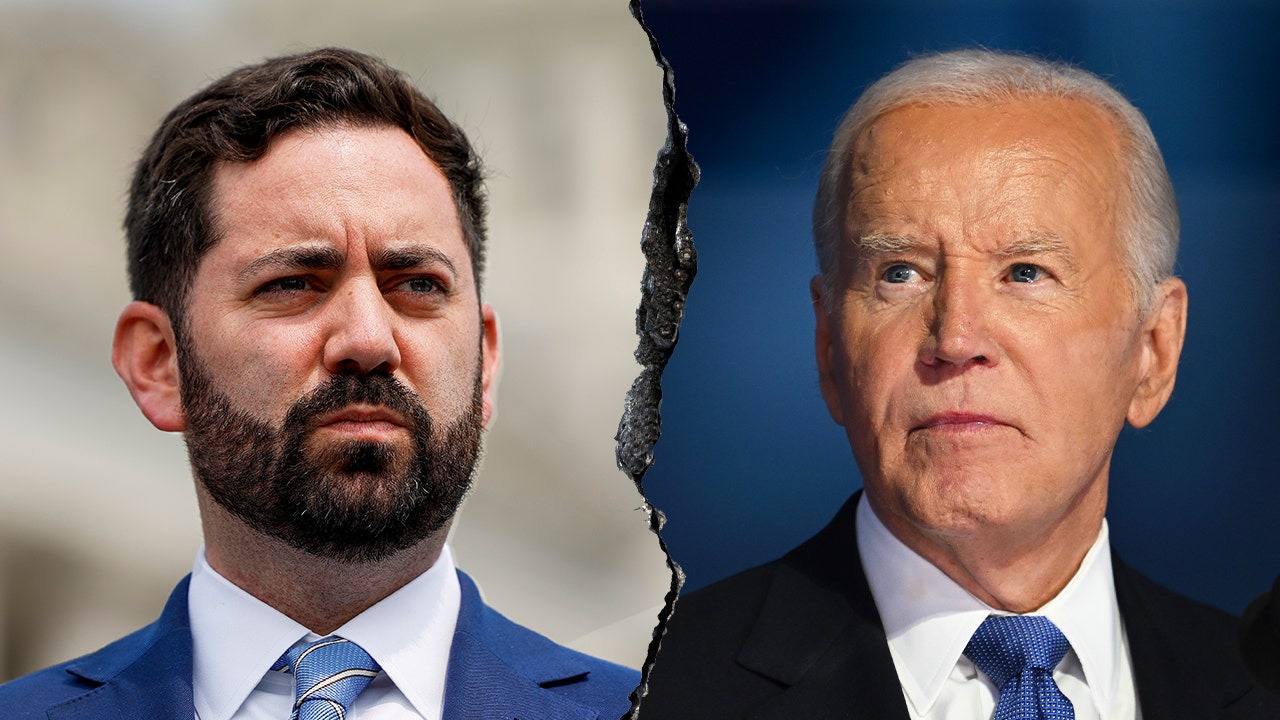World
European Union ‘vulnerable’ unless it enlarges – Germany’s Baerbock

Germany’s foreign minister Annalena Baerbock has said the European Union must enlarge to avoid making everyone on the European continent more vulnerable.
“Putin’s Moscow will continue to try to divide not only Ukraine from us, but also Moldova, Georgia and the Western Balkans,” Baerbock said in a speech on Thursday.
“If these countries can be permanently destabilised by Russia, then that also makes us vulnerable, it makes us all vulnerable. We can no longer afford grey areas in Europe,” she added.
Baerbock’s comments came as she hosted 17 foreign ministers from EU and candidate countries, including Ukraine’s Dmytro Kuleba, for a conference in Berlin focused on EU enlargement.
The war raging in Ukraine has forced the EU to revive the stalled debate on enlargement.
The European Commission is due to publish an annual assessment next week of candidate countries’ progress in implementing the key institutional, judicial and economic reforms needed to be fit for EU membership.
But the bloc also needs to deeply re-think its own institutional, financial and decision-making frameworks to ensure it remains efficient with more members. European Council President Charles Michel has pitched 2030 as the deadline for the EU to be ready to enlarge, but the European Commission has distanced itself from such a timeline.
In her speech, Baerbock urged the bloc to make the bold reforms needed to ensure speedy accession to the bloc for candidate countries such as Ukraine, and pitted enlargement as essential for the EU to hold on to its geopolitical influence and cement its unity.
“If we support these countries in the accession process to strengthen their democratic institutions, improve their resilience and offer people economic prospects, then we are not just closing a geopolitical flank but we strengthen our community,” Baerbock said.
In an echo of proposals made in a recent report commissioned by France and Germany, she also pitched scrapping the current ‘all or nothing’ approach in favour of phased integration, so that the citizens of candidate countries feel the benefits of EU membership even before they become fully-fledged EU citizens.
“Sometimes seemingly small or technical-sounding things can have a big impact (…) for example, students from North Macedonia, Serbia and Turkey who can study in the European Union with Erasmus scholarships,” she said, suggesting other “practical” benefits such as free EU roaming and simplified visa procedures should be offered to candidate countries.
Baerbock also shared ambitious ideas on how the EU could reform its institutions, including abolishing the current system whereby each member state is allocated its own commissioner to oversee a key aspect of Union policy.
Germany is ready to “forego” its commissioner for a set period of time, she said, suggesting a rotating system of commissioners that could be difficult to contemplate among smaller member states.
An alternative could be splitting the largest Commission portfolios – such as economic policy or external action – between a group of commissioners representing various member states.
In a nod to the divisions that have emerged between senior EU officials in the bloc’s incoherent response to the Israel-Hamas war, Baerbock said “responsibilities and competencies” should be clarified.
“Is it really helpful if foreign interlocutors do not know whether they should invite the President of the Commission, the President of the European Council or the High Representative on such geostrategic issues if they want to talk about their relationship with the EU?” Baerbock asked.
Candidates warn of ‘frustration’
In a debate with Baerbock and the foreign ministers of Slovenia and North Macedonia, Ukraine’s foreign minister Dmytro Kuleba warned the EU against using its own reforms to delay Ukraine’s accession.
“I think the trap we all have to avoid jointly to succeed and to make the EU a stronger player in the world is frustration,” he said, saying the EU’s inability to promise membership has created frustration in Ukraine, and its inability to deliver on its promise of membership has sowed the same frustration in the Western Balkans.
“Now we have to build a process of enlargement and reform in a way that there will be no frustration from a protracted reform of the European Union,” he explained. “We have to avoid a situation where the reform of the EU will be used one way or another as an argument to delay enlargement.”
The foreign minister of North Macedonia, Bujar Osmani, also called for a phased integration into the bloc to provide assurances to his population that the EU is serious about expanding.
He said North Macedonia’s accession process was “derailed” despite his country being the “best student in the class” for years.
“We have concluded that the sources of the frustration is the focus on the formal membership itself,” Osmani said. “Therefore we have promoted this concept of more integration before membership.”
Osmani also warned that there are “malign” actors looking to hijack candidate countries’ frustration with lack of progress in the path to EU membership.

World
Creature Commandos Renewed for Season 2 at Max

ad
World
Trump could face renewed ISIS threat in Syria as Turkey goes after US ally

Concerns over a resurgence of the Islamic State in Syria remain heightened following the fall of the Bashar al-Assad regime and an increase in attacks targeting U.S.-aligned Syrian Democratic Forces (SDF).
President-elect Donald Trump may well face another round against the extremist group as the SDF faces a reality in which it may have to divide its focus between ISIS and threats levied at it by Turkey.
The SDF said five of its soldiers were killed Saturday in attacks by Turkish-backed forces in northern Syria, reported Reuters.
Anti-regime fighters stand on the roadside as displaced Syrian Kurds drive vehicles loaded with belongings on the Aleppo-Raqqa highway to flee areas on the outskirts of the northern city of Aleppo which were formerly controlled by the Kurdish-led Syrian Democratic Forces (SDF), after they were seized by Islamist-led rebels on Dec. 2, 2024. (RAMI AL SAYED/AFP via Getty Images)
TRUMP SAYS TURKEY ‘DID AN UNFRIENDLY TAKEOVER’ IN SYRIA AS US-BROKERED CEASE-FIRE APPEARS TO FAIL
The attacks came following an apparent collapse in a cease-fire agreement brokered by the Biden administration as the U.S. and the SDF ramp up efforts to counter ISIS.
National security advisor Jake Sullivan on Sunday told CNN that his “single biggest concern” is the return of ISIS, which was deemed “defeated” in 2019.
“ISIS loves vacuums,” he said in reference to the extremist group’s use of power struggles in places like North Africa to gain footholds. “What we see in Syria right now are areas that are basically ungoverned because of the fall of the Assad regime.
“Our goal is to ensure that we support the SDF — the Kurds — and that we keep ISIS in check,” he added.

Comrades attend the funeral of five fighters of the Kurdish-led Syrian Democratic Forces (SDF) who were killed in Manbij during clashes with Turkish-backed opposition factions earlier this week, in Qamishli in northeastern Syria on Dec. 14, 2024. (DELIL SOULEIMAN/AFP via Getty Images)
The U.S. has long had to balance its campaign against ISIS in Syria — which it is fighting with the help of the Kurdish coalition forces, despite Turkey deeming the SDF as akin to the terrorist network the Kurdistan Workers Party (PKK) — with Washington’s partnership alongside Ankara as a NATO ally.
“The SDF and the Assad regime were the primary opponents of ISIS,” Bill Roggio, senior fellow at the Foundation for Defense of Democracies and founding editor of “The Long War Journal,” told Fox News Digital. “With the former gone and the latter under pressure from Turkish proxies, concerns about the expansion of ISIS are warranted.”
“Turkey wants to destroy the SDF,” Roggio confirmed. “Turkey has the ideal opportunity to destroy the SDF, and it will take advantage of this unique situation. I expect attack[s] against the SDF to increase.”
PRESIDENT-ELECT TRUMP’S SYRIA DILEMMA: INTERVENE OR LET IT TURN INTO TERROR STATE
The Biden administration has already taken steps to ramp up its campaign against ISIS, hitting more than 75 sites in a significant strike earlier this month on known “ISIS leaders, operatives and camps,” U.S. Central Command (CENTCOM) confirmed.

A soldier from the US-led coalition gestures towards schoolchildren during a joint U.S.- Kurdish-led Syrian Democratic Forces (SDF) patrol in the countryside of Qamishli in northeastern Syria Feb. 8, 2024. (Reuters/Orhan Qereman)
The operation coincided with the fall of Damascus on Dec. 8 following a sweeping takeover of Aleppo, Hama and Homs by Hay’at Tahrir al-Sham (HTS), which was aided by the Turkey-backed Syrian National Army (SNA).
In addition, CENTCOM on Thursday killed ISIS leader Abu Yusif aka Mahmud using a precision airstrike in eastern Syria — an area where, according to Syrian news outlets, ISIS has been able to seize weapons depots belonging to the former Syrian military under the Assad regime amid the “chaos.”
SDF forces in an attempt to clamp down on ISIS uprisings captured 18 ISIS terrorists and suspected collaborators on Sunday near the city of Raqqa, which was once an ISIS stronghold, according to ANF News.
The campaign was reportedly done “in cooperation with the international coalition forces,” but CENTCOM has not yet confirmed whether the U.S. was involved.

US forces provide military training to members of the YPG/SDF, which Turkey consider as an extension of PKK in Syria, in the Qamisli district in the Al-Hasakah province, Syria on Aug. 18, 2023. The PKK is designated as a terrorist organization by the United States, Turkiye, and the European Union. (Hedil Amir/Anadolu Agency via Getty Images)
But concern remains high that the SDF could see its operational abilities divided as attacks from the Turkey-backed SNA coalition forces increase — which could spell trouble for the upcoming Trump administration as it looks to prevent another resurgence of ISIS, while balancing U.S. relations with Turkey, which is further expected to exercise outsized influence over the new Syrian government.
“We continue to monitor the situation in Syria,” Brian Hughes, Trump-Vance Transition spokesperson said in response to questions from Fox News Digital. “President Trump is committed to diminishing threats to peace and stability in the Middle East and to protecting Americans here at home.”
World
Gaza’s Kamal Adwan Hospital director pleads for help before it’s ‘too late’

Israel orders emptying of medical facility with nearly 400 civilians inside, including babies who need oxygen and incubators.
The director of one of Gaza’s last partially functioning hospitals is appealing for help, saying Israeli forces have surrounded the medical facility.
Dr Hussam Abu Safia, director of Kamal Adwan Hospital in northern Gaza, on Monday urged the international community to act “before it is too late”, calling the situation “horrifying”.
He said obeying an Israeli order to empty the facility would be “next to impossible” because nearly 400 civilians remain inside, including babies who need oxygen and incubators.
“The bombing continues from all directions, affecting the building, the departments and the staff. This is a serious and extremely horrifying situation,” Abu Safia said.
Outside the hospital in Beit Lahiya, Israeli forces have placed what is thought to be explosives at the gates. Witnesses said an automated guided vehicle delivered boxes with the word “danger” written on them.
Al Jazeera’s Gaza correspondent Tareq Abu Azzoum said the Israeli military has deployed automated remote vehicles called “explosive robots” around the hospital.
“[The robots] are loaded with tonnes of explosives that can lead to the destruction of the neighbourhood,” Abu Azzoum said.
“We’ve seen videos released by some of the medical workers inside Kamal Adwan Hospital showing how the Israeli military has been using these in the vicinity of the hospital,” he added, saying it could be a sign that further escalation might take place in the coming days.
“The Israeli military is systematically trying to exert ultimate pressure on the medical teams by causing severe destruction to the surroundings [of the hospital],” Abu Azzoum said.
Abu Safia said: “The world must understand that our hospital is being targeted with the intent to kill and forcibly displace us,” adding that the Israeli bombing did not stop throughout Sunday night, destroying homes and surrounding buildings.
“We urge the international community to intervene quickly and stop this fierce assault on us to protect the healthcare system, the workers and the patients within it,” the hospital director said.
Since Monday morning, the hospital has been targeted with bombs in its courtyards and on its rooftop dropped by quadcopters, once again threatening the hospital’s fuel and oxygen supplies, he said.
“The situation remains extremely dangerous and requires urgent international intervention before it is too late,” the doctor said.
Abu Safia made a similar appeal on Sunday, accusing Israel of directly bombing the hospital’s intensive care unit.
More than 14 months of Israeli attacks have devastated Gaza and displaced almost all of its 2.3 million people. More than 45,000 people, mostly children and women, have been killed in the offensive.
Israel’s genocide against Palestinians started shortly after a Hamas-led incursion inside Israeli territory on October 7, 2023 killed nearly 1,100 people, according to Israeli officials, and about 250 others were taken captive.
-
/cdn.vox-cdn.com/uploads/chorus_asset/file/25789444/1258459915.jpg)
/cdn.vox-cdn.com/uploads/chorus_asset/file/25789444/1258459915.jpg) Technology1 week ago
Technology1 week agoOpenAI cofounder Ilya Sutskever says the way AI is built is about to change
-

 Politics1 week ago
Politics1 week agoU.S. Supreme Court will decide if oil industry may sue to block California's zero-emissions goal
-
/cdn.vox-cdn.com/uploads/chorus_asset/file/25546252/STK169_Mark_Zuckerburg_CVIRGINIA_D.jpg)
/cdn.vox-cdn.com/uploads/chorus_asset/file/25546252/STK169_Mark_Zuckerburg_CVIRGINIA_D.jpg) Technology1 week ago
Technology1 week agoMeta asks the US government to block OpenAI’s switch to a for-profit
-

 Business1 week ago
Business1 week agoFreddie Freeman's World Series walk-off grand slam baseball sells at auction for $1.56 million
-
/cdn.vox-cdn.com/uploads/chorus_asset/file/23951353/STK043_VRG_Illo_N_Barclay_3_Meta.jpg)
/cdn.vox-cdn.com/uploads/chorus_asset/file/23951353/STK043_VRG_Illo_N_Barclay_3_Meta.jpg) Technology1 week ago
Technology1 week agoMeta’s Instagram boss: who posted something matters more in the AI age
-
News1 week ago
East’s wintry mix could make travel dicey. And yes, that was a tornado in Calif.
-
/cdn.vox-cdn.com/uploads/chorus_asset/file/24924653/236780_Google_AntiTrust_Trial_Custom_Art_CVirginia__0003_1.png)
/cdn.vox-cdn.com/uploads/chorus_asset/file/24924653/236780_Google_AntiTrust_Trial_Custom_Art_CVirginia__0003_1.png) Technology3 days ago
Technology3 days agoGoogle’s counteroffer to the government trying to break it up is unbundling Android apps
-

 Politics4 days ago
Politics4 days agoIllegal immigrant sexually abused child in the U.S. after being removed from the country five times



















